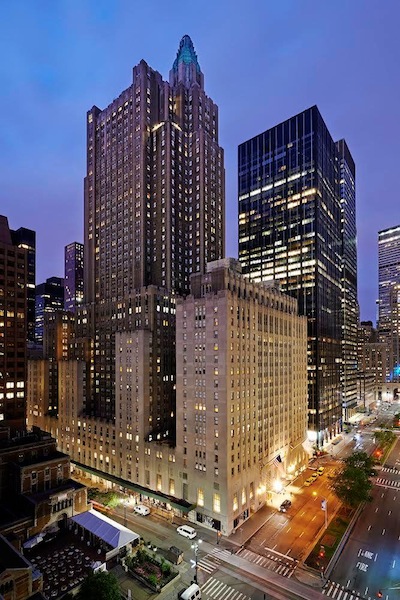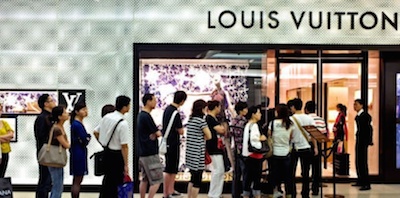 The Arcade at Peninsula Shanghai
The Arcade at Peninsula Shanghai
Travel is an essential part of life for two-thirds of China’s outbound travelers, according to a report from Hotels.com. The 2015 Chinese International Travel Monitor reveals that even with the economy sputtering, consumers plan to travel more and spend more while traveling than they have in the past. If China’s ballooning affluent and middle classes maintain this behavior, they can offer luxury brands a reprieve from the otherwise tumultuous times. "Interestingly, two-thirds of outbound Chinese travelers consider travel to be an essential part of life – and are prepared to spend nearly a quarter of their income on travel, providing retail operators with enormous growth opportunity," said Taylor L. Cole, travel expert North America at Hotels.com. "With travel comes other discretionary spending on retail.
"Brands need to remember that China continues to be the top global spender in terms of tourism expenditures, and the potential for growth with the market is enormous with only five percent of the nearly 1.4 billion Chinese citizens currently holding passports," she said.
Slowing growth, speeding travel The National Bureau of Statistics of China reported 6.7 percent GDP growth for the second quarter of 2016 – higher than market expectations and equal to the previous quarter. Nevertheless, the expectation of 6.3 percent in 2017 would be the lowest in over a quarter of a century. Perhaps because even a slowing China is one of the fastest growing economies in the world, consumers are keeping their wallets open. A third of Chinese travelers plan to travel more in the coming year, and a whopping 92 percent plan to maintain or increase spending in the same timeframe. Weibo picture with Eiffel Tower in the background
As hotels prepare for these travelers, the study reveals the five most common requests they have for U.S. hoteliers, a list that likely looks similar for European and Australian hotels.
Overwhelmingly, the top request is free WiFi, at 75 percent. While numerous luxury hotels have begun to provide free WiFi, some still continue to charge for it, alienating themselves from these 120+ million travelers.
Smoking rooms are also important to Chinese travelers. While smoking rates have plummeted in the United States, the rate of smokers in China is around twice as high. While 20 percent – one-half to one-third of smokers, depending on the source – said smoking rooms are a high-priority concern, the rest of consumer segment would likely appreciate it them well.
Weibo picture with Eiffel Tower in the background
As hotels prepare for these travelers, the study reveals the five most common requests they have for U.S. hoteliers, a list that likely looks similar for European and Australian hotels.
Overwhelmingly, the top request is free WiFi, at 75 percent. While numerous luxury hotels have begun to provide free WiFi, some still continue to charge for it, alienating themselves from these 120+ million travelers.
Smoking rooms are also important to Chinese travelers. While smoking rates have plummeted in the United States, the rate of smokers in China is around twice as high. While 20 percent – one-half to one-third of smokers, depending on the source – said smoking rooms are a high-priority concern, the rest of consumer segment would likely appreciate it them well.
 Waldorf Astoria New York
Lower priority – but also of lower availability among many hotels – are Chinese tea, a kettle and translated travel guides, at 17, 16 and 13 percent respectively. Brands that can personalize rooms to accommodate Chinese travelers with these three things can develop a distinct point of differentiation from competitors and highlight their personalized service and high standards.
Just as revealing, the top 10 percent of travelers spend an average of $2,225 a day on hotels and other expenses. They opt for reputation over price, and prefer international chains – such as Four Seasons, Ritz-Carlton or St. Regis – to their independent competitors 46 percent to 28 percent.
In order, the preferred countries to visit are Australia, France and the U.S. at 37 percent, 27 percent and 22 percent. Japan, Hong Kong, South Korea, the U.K., Germany, Italy and Canada round out the top 10.
Waldorf Astoria New York
Lower priority – but also of lower availability among many hotels – are Chinese tea, a kettle and translated travel guides, at 17, 16 and 13 percent respectively. Brands that can personalize rooms to accommodate Chinese travelers with these three things can develop a distinct point of differentiation from competitors and highlight their personalized service and high standards.
Just as revealing, the top 10 percent of travelers spend an average of $2,225 a day on hotels and other expenses. They opt for reputation over price, and prefer international chains – such as Four Seasons, Ritz-Carlton or St. Regis – to their independent competitors 46 percent to 28 percent.
In order, the preferred countries to visit are Australia, France and the U.S. at 37 percent, 27 percent and 22 percent. Japan, Hong Kong, South Korea, the U.K., Germany, Italy and Canada round out the top 10.
 Chinese tourists outside a Louis Vuitton boutique
Overall, the income of international travelers has skyrocketed – almost $70,000 compared to less than $40,000 the year before.
The influx of income among international spenders is good news not only for hotels, but also for retail brands. For both the top 10 and top 5 percent, shopping was the favorite activity, even beating out sightseeing, suggesting a constantly growing base of consumers from China to market to.
Around the world
Brands can no longer hope to stay competitive while appealing only to local consumers.
Tourists account for around 30 percent of luxury good sales, according to a new study from ContactLab and Exane BNP Paribas.
Within heritage countries, the numbers are even higher, with luxury travelers accounting for as much as 80 percent of revenues. The spending habits of travelers are exerting a growing influence on the luxury industry, and retailers need to adapt to stay ahead, particularly during the summer, which travelers often favor (see story).
Also included in the study is a section about the impact of China’s millennials and changes in digital booking.
Chinese tourists outside a Louis Vuitton boutique
Overall, the income of international travelers has skyrocketed – almost $70,000 compared to less than $40,000 the year before.
The influx of income among international spenders is good news not only for hotels, but also for retail brands. For both the top 10 and top 5 percent, shopping was the favorite activity, even beating out sightseeing, suggesting a constantly growing base of consumers from China to market to.
Around the world
Brands can no longer hope to stay competitive while appealing only to local consumers.
Tourists account for around 30 percent of luxury good sales, according to a new study from ContactLab and Exane BNP Paribas.
Within heritage countries, the numbers are even higher, with luxury travelers accounting for as much as 80 percent of revenues. The spending habits of travelers are exerting a growing influence on the luxury industry, and retailers need to adapt to stay ahead, particularly during the summer, which travelers often favor (see story).
Also included in the study is a section about the impact of China’s millennials and changes in digital booking.
 Four Seasons Chinese app
Among the notable findings, the use of smart phone apps to plan and book jumped from 17 percent to 50 percent, suggesting that investment in Weibo and WeChat could pay off. More alarming is that luxury hotels are losing millennial travelers to boutique hotels, and the rapid increase in travel potential for this group is an opportunity brands should seize.
China’s outbound luxury travelers spend $65,000 per household on tourism per year, including $34,000 on travel shopping, according to a new study from the Hurun Research Institute and Marriott International.
Chinese outbound tourists have long been a high-priority group for luxury brands, but the demands and habits of younger travelers are changing quickly. The digital natives aged between 18 and 36 years old want a more personalized experience, including superior guest services and smart device integration (see story).
"The travel and hotel industry should focus on millennials," Ms. Cole said. "According to our survey data, millennials are the highest proportion of all Chinese travelers and they spend 27% of their income on travel.
Four Seasons Chinese app
Among the notable findings, the use of smart phone apps to plan and book jumped from 17 percent to 50 percent, suggesting that investment in Weibo and WeChat could pay off. More alarming is that luxury hotels are losing millennial travelers to boutique hotels, and the rapid increase in travel potential for this group is an opportunity brands should seize.
China’s outbound luxury travelers spend $65,000 per household on tourism per year, including $34,000 on travel shopping, according to a new study from the Hurun Research Institute and Marriott International.
Chinese outbound tourists have long been a high-priority group for luxury brands, but the demands and habits of younger travelers are changing quickly. The digital natives aged between 18 and 36 years old want a more personalized experience, including superior guest services and smart device integration (see story).
"The travel and hotel industry should focus on millennials," Ms. Cole said. "According to our survey data, millennials are the highest proportion of all Chinese travelers and they spend 27% of their income on travel.
"We’ve noted some interesting changes with Chinese travelers, such as: improved English; travelers are increasingly looking for value for their money and travelers have higher expectations, more demanding requirements and spend less," she said. "Additionally, fifty one percent of hoteliers in the U.S. experienced an increase of Chinese guests traveling for leisure, which is a good space for hotels to play in."
